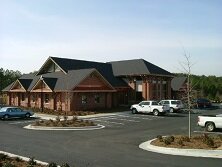Hepatology
Comprehensive Care for Complex Liver Conditions
Patients with chronic and acute liver diseases in Georgia and South Carolina can rely on expert management close to home thanks to our expert hepatologists, the region’s only liver disease specialists affiliated with a comprehensive care center.
We care for patients with:
- Acute liver failure
- Viral hepatitis, for example, hepatitis A, B, C, E and hepatitis associated with cytomegalovirus and Epstein-Barr virus
- Autoimmune disorders, such as primary sclerosing cholangitis, primary biliary cirrhosis, autoimmune hepatitis and IgG4-associated autoimmune hepatitis—which damage the bile ducts and lead to liver cirrhosis
- Fatty liver disease, alcohol or non-alcohol related
- Metabolic disorders, including hemocromotosis or Wilson’s disease, which cause excess mineral buildup in the liver
- Liver lesions and tumors, both cancerous and non-cancerous
- Complicated cirrhosis, including gastroesophageal varices (enlarged veins), ascites (fluid buildup) or hepatic encephalopathy
- Liver transplant recovery and ongoing management, including immuno-suppression and disease management
Multidisciplinary Treatment Team
Diseases affecting the liver are highly complex and require the care of a multidisciplinary team. At Georgia Regents Digestive Health Center, our team includes hepatologists, interventional radiologists, liver radiologists, liver surgeons and a dedicated dietitians and nurse practitioners who stay in constant communication throughout your treatment plan.
Our comprehensive approach includes diagnosis, treatment as well as prevention of liver diseases.
Diagnosis
- Liver biopsies, which are the gold standard in determining liver status. Our hepatologists personally perform microscopic evaluations on liver tissue post-biopsy to help determine a comprehensive management plan that is appropriate for each individual patient.
- Percutaneous biopsy uses a small needle inserted through the chest or abdomen to obtain a small sample of liver tissue
- Transjugular biopsy is performed by an interventional radiologist, who guides a narrow tube and needle from the jugular vein in the neck to the liver
- Laparoscopic biopsy is performed under general anesthesia and uses minimally invasive tools and tiny incisions to obtain a liver sample
- Imaging studies, including computed tomography (CT), magnetic resonance imaging (MRI) scans, ultrasound and angiography
- Endoscopic screening for varices (enlarged veins in the esophagus and stomach)
- Liver cancer screening for patients with cirrhosis, according to guidelines of the American Cancer Society and the American Association for the Study of Liver Diseases
Treatments
- Medication management, using state-of-the-art therapies and the latest protocols
- Ascitic taps, which drain fluid from the abdomen, a common complication of liver disease
- Endoscopic retrograde cholangiopancreatography (ERCP), to open up biliary strictures and other obstructions
- Endoscopic therapies for gastroesophageal varices
- Placement of interhepatic shunts (TIPS) to treat varices and uncontrolled fluid overload
Prevention
- Vaccinations for hepatitis A and B
- Counseling by our physicians and dietitians on lifestyle modifications
Liver Cancer
A liver cancer diagnosis is challenging because this type of cancer is often found at the later stages of chronic liver disease, when it is more difficult to treat. As part of an academic medical center, the Georgia Regents Digestive Health Center offers groundbreaking targeted therapies to treat cancer and improve patients’ quality of life.
Liver cancer screening is a routine part of the care we provide to patients at high risk for developing liver cancer.
The size and number of tumors determines whether patients can benefit from less invasive therapies here at Georgia Regents Medical Center, such as radiofrequency ablation, transcatheter arterial chemoembolization (TACE) or surgical resection. Patients with liver cancer who need a transplant may be referred to our surgical care partners in Atlanta, with follow-up and ongoing management here at the Georgia Regents Digestive Health Center.
MELD Calculator
The Model for End-Stage Liver Disease or MELD is a scoring system used by medical professionals to assess the severity of liver disease. A patient’s score determines his or her prognosis for prioritizing liver transplant.
Meet Your Liver Care Team
Dr. Sandeep Khurana, hepatologist and director
Dr. Thomas Kiernan, hepatologist
Dr. Anthony Martin, hepatologist
Michael Hodo, DNP, AGACNP-BC, advanced practice nurse practitioner
Dr. Eran Rotem, interventional radiologist
Dr. Gregory Bowers, interventional radiologist
Dr. Thomas Estes, radiologist (abdominal imaging)
Dr. Todd Merchen, liver surgeon
Dr. Asha Nayak Kapoor, oncologist
Dr. Edward J. Kruse, liver surgeon
Dr. Jeffrey R. Lee , liver pathologist
Dr. Suash Sharma, liver pathologist
Schedule Your Appointment Now
Schedule an online appointment or call 706-446-GUTS (4887) to speak to a member of our digestive health team.





